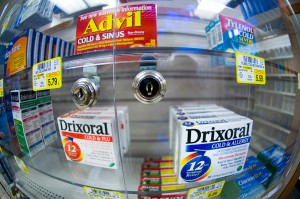
A new drug aimed at combatting drug overdose is out on the market. Narcan nasal spray, the brand name for naloxone hydrochloride, is a life-saving drug that can reverse the effects of an opioid overdose. The drug was recently approved by the Food and Drug Administration, and although versions of the drug have been used by health professionals for decades, politicians are working on putting it in the hands of people who may have friends and family with drug problems.
Drug overdose deaths are currently the leading cause of injury deaths in the United States, according to a report released by the FDA. For the past decade, the number of overdose deaths has largely been driven by prescription drugs according to the Center of Disease Control and Prevention. For many addicts, medical intervention is the only hope during an overdose.
Utah ranked fifth-highest for overdose deaths per 100,000 people in 2014, or an average of 21 people a month, according to the Utah Department of Health.
“That is approximately one person a day who dies from an overdose,” said Rep. Carol Spackman Moss, D-Salt Lake City.
Moss sponsored a bill signed into law by the Utah Legislature last year that allows doctors to prescribe naloxone to laypeople who don’t need a prescription for themselves. These efforts will provide family and friends the tools to treat someone likely to overdose on opioids, Moss said.
Naloxone is commonly used in hospitals and by emergency medical services providers and is not typically available outside hospital and EMS system.

Naloxone blocks opioid receptors which stop opioids from attacking and reverses the effect caused by prescription pain pills or heroin. People who have overdosed react quickly to naloxone and will immediately begin experiencing symptoms of withdrawal.
“It is literally a life-saving drug,” Moss said.
According to Moss, naloxone will not harm a person if they are given too much, and she compared the naloxone kit to an EpiPen. Moss also advised that an overdose victim should still receive medical attention despite the use of a naloxone kit.
“Anyone who lives with someone who is taking prescription drugs, illegal drugs, or has been to rehab and stands the risk of relapsing, then they can get a prescription and have it there in case,” Moss said.
Utah was the 17th state to pass laws to support the distribution of naloxone. More than 40 states have passed similar laws. Some states allow pharmacies to administer naloxone without a prescription. CVS/pharmacy announced in September that it will sell naloxone without a prescription in 14 states, including Utah.
Naloxone was approved by the Food and Drug Administration in 1971. Paramedics and many law enforcement personnel have carried naloxone with them for decades.
But not all professionals are optimistic about the drug’s benefits. Dr. Bryan C. Mason, from St. Luke’s Clinic Physician Center, has used naloxone on patients who have overdosed and said those published numbers may be an overestimate of how many lives the drug actually saves.According to Utah Naloxone, there were 644 local opioid overdose prevention programs that were distributing naloxone to laypersons nationwide.
“Not everyone who receives Narcan would have died from their overdose,” Mason said.
From Mason’s experience, most overdose fatalities occur while the victim is asleep at night, at a party where no one is in the state of mind to help the victim or while the victim is alone.
“Naloxone works, but as far as helping our problem in overdose deaths I don’t think it will make a huge impact,” he said. “It could have a drop in the bucket effect.”




